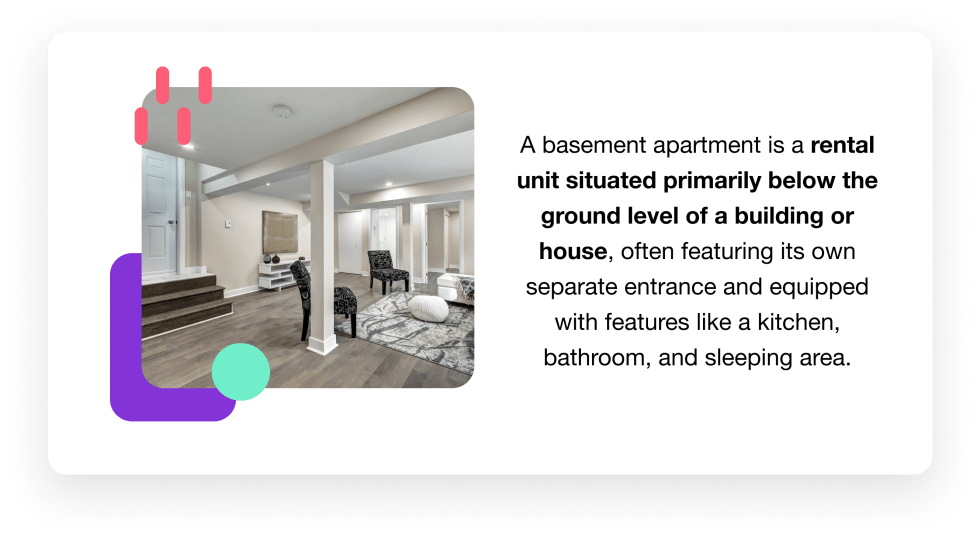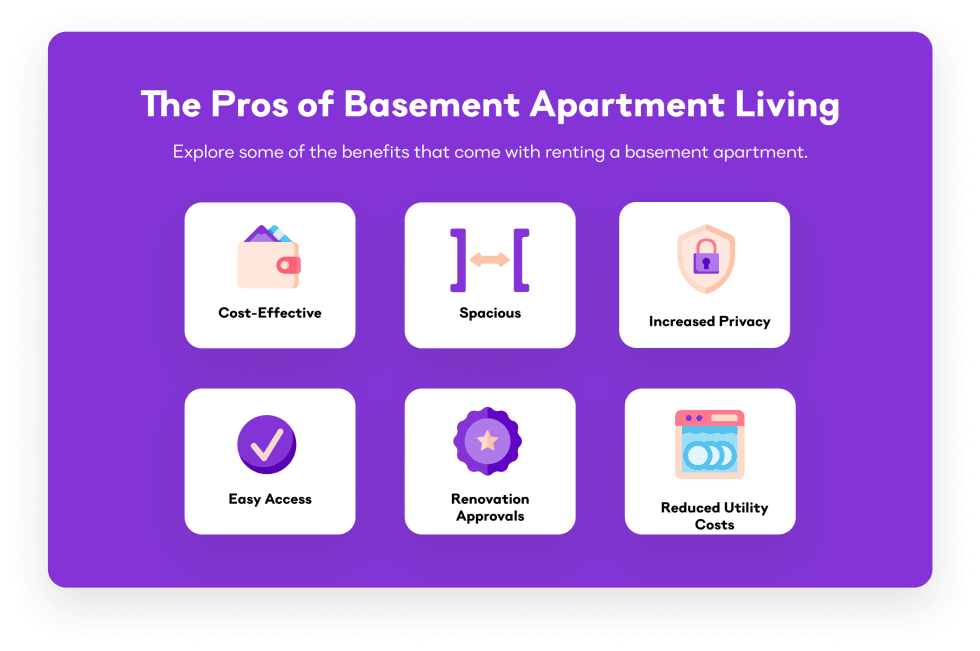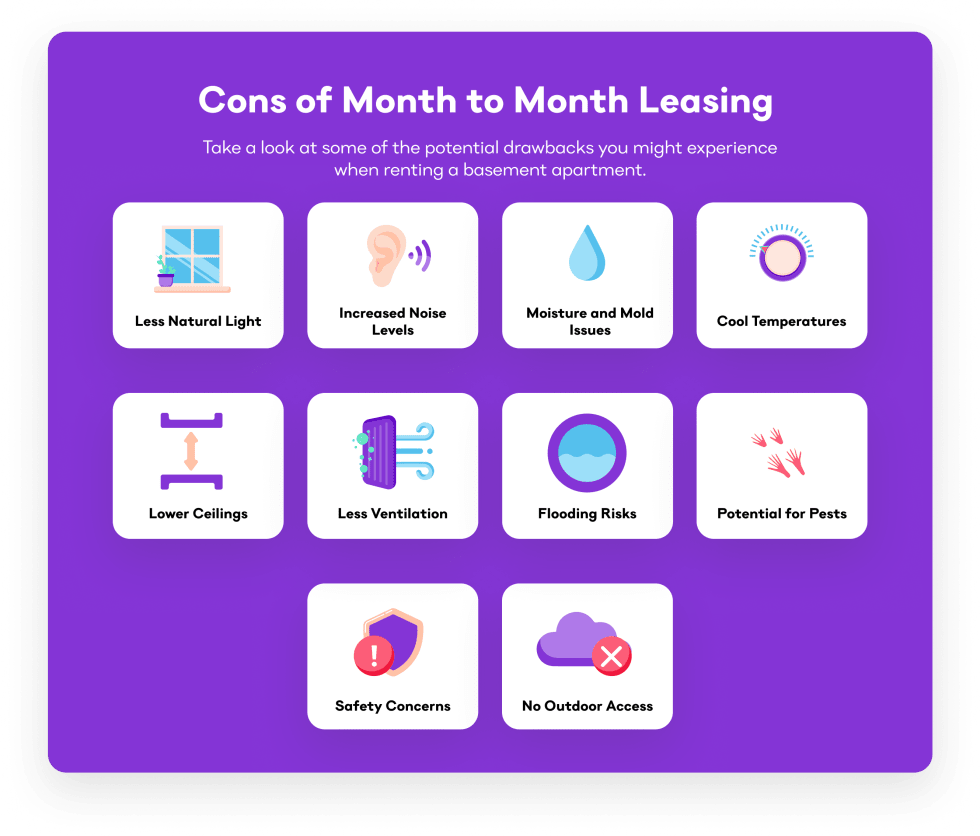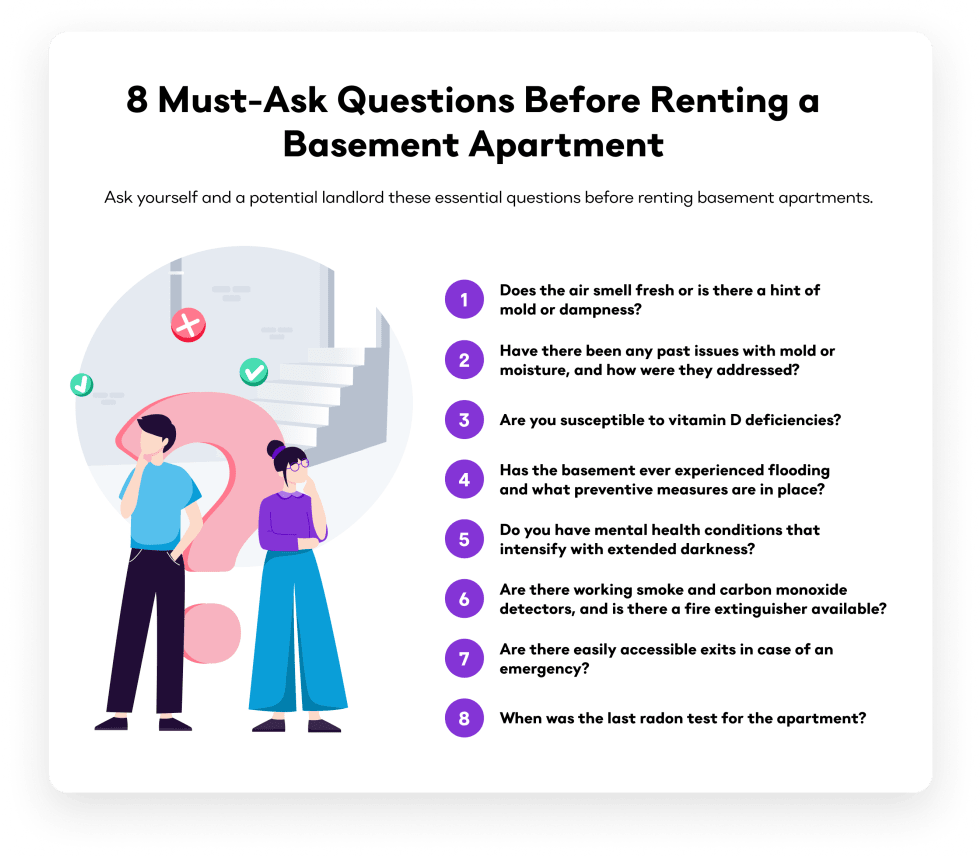- 47 units available
- 1 bed • 2 bed • 3 bed
- Amenities
In unit laundry, Hardwood floors, Dishwasher, 24hr maintenance, Stainless steel, Walk in closets + more

If you can’t afford to pay sky-high rent prices or the lack of vacant units, especially in urban areas, is limiting your apartment hunting capabilities, you might consider opting for a basement apartment.
We want to teach you everything you need to know about these units if you’re thinking about taking the leap into basement living. Come with us as we explore the different types of basement apartments for rent, the pros and cons of basement rentals, and questions to ask when before renting a basement unit.
A basement apartment is a living space primarily below ground level, typically found in apartment complexes or multi-family properties. While at least 50% of the unit is beneath the surface, basement apartments often feature larger windows that allow some natural light. Though this light is less abundant than in above-ground units, it significantly brightens the space and is particularly appreciated during sunnier seasons.

Though the general definition of a basement apartment is any basement rental unit that is partially or full below the ground level, there are several different types of basement apartments to choose from, including:
So, now that you understand different types of basement apartments available, the question becomes, is will living in a basement apartment be all it’s supposed to be?
Can you live in a basement apartment comfortably? Let’s look at the basement apartment pros and cons to find out, starting with the positives.
One of the biggest basement pros is that most of these apartments come at a more affordable rate compared to their above-ground and garden-level counterparts. While you might sacrifice abundant natural light and panoramic views, the upside is a friendlier price tag. It's all about getting value for your money.
Renters often find that basement units offer a more expansive living space than other apartments within the same property. This surprising roominess, even in larger complexes, is attributed to the essential home systems—like HVAC, plumbing, and laundry utilities—occupying areas that might have been allocated for another apartment. This unique layout not only provides functional systems but also often translates to a bonus in living area for basement dwellers.
Many basement apartments come with the perk of a private entrance, adding an exclusive touch to your living space. Plus, if it's part of a single-family property, chances are you'll be the sole dweller enjoying the seclusion of the basement level. This separation often provides an added layer of privacy and quiet, making it feel like your own personal retreat.

Living in a basement suite means street-level convenience. For those familiar with bustling cities, the ease of street access is a major perk. Imagine not having to carry groceries up several flights of stairs or swiftly stepping out with your pet for a quick bathroom break. That's the simplicity a basement apartment offers.
Depending on your landlord’s policies and local building regulations, basement apartments might provide you with more flexibility when it comes to personalizing your space and making minor renovations. Of course, any small renovations, such as lighting or updated fixtures, will depend completely on your landlord and the terms of your lease, so you’ll need to have a conversation with them prior.
One of the major benefits to living in a basement apartment is taking advantage of natural insulation, all thanks to the below-ground location. As a result, many basement apartments are more energy-efficient, meaning reduced cooling and heating bills on your end. In the end, you could benefit from long-term savings.
While basement apartments come with their perks, they also have their drawbacks. Let's delve into the potential disadvantages of living in basement apartments:
Though basements are situated somewhat aboveground, there’s a distinct lack of natural light when compared to other apartments. This can be difficult to handle in the winter months. Consider investing in lights with adjustable brightness settings, as well as mirrors to help reflect the light that does come into the space.
You can explore our 10 tips to incorporating more over-head lighting for more inspiration to brighten up your space.
Generally, there’s a lack of noise insulation between the first and basement floors. This can make the noises of your upstairs neighbors seem much louder than they are. Not to mention, the sound of the sump pump kicking on during rainy weather and the roar of the HVAC system isn’t exactly quiet.

Basement apartments are moist. Consistent moisture breeds mold, even if your apartment has been professionally treated. Unfortunately, this can also lead to a mildew-esque smell that lingers throughout the unit.
In the summer, basement apartments are the place to be as they’re naturally cool. However, when winter comes, expect freezing temperature unless you’ve invested in a personal heater.
A drawback of basement apartments is their typically lower ceilings, which can make the space feel more confined. If you are taller than average, you may find it uncomfortable to navigate through the apartment, as the limited vertical space can make it feel cramped.
Proper ventilation is one of the biggest challenges that apartment basements face, especially those that are completely below-ground. This can make it difficult to control indoor humidity levels and make it difficult to get rid of stale air.
In the worst case scenario, inadequate ventilation could lead to issues with mold and mildew, which could be harmful to your health and require professional maintenance.
Depending on the region in which your basement apartment is, it could be prone to flooding during flood season or heavy rains. Regardless of whether your sump pump is connected to the sewage system or the stormwater drainage system, your belongings could get soaked.
In a basement apartment, you’re either at or below ground level, meaning you’re far more likely to see creepy crawlers in your space. If you can’t get used to spiders, centipedes, and other common household pests, the basement life might not be for you.
Are basement apartments safe? Well, unfortunately, there’s a chance that your underground apartment could be more vulnerable to security threats. Many basement apartments are closer to the building’s exterior, and some have window entrances at ground level. You’ll want to make sure you have the right security measures in place so you feel safe and secure.
Basement apartments do not come with outdoor access, such as a patio or backyard. If you want to enjoy outdoor recreation, you’ll have to look elsewhere, such as your local parks or hiking trails.
When looking at basement units for rent, it's not just about snagging that cozy corner spot. Knowledge of local laws and regulations is essential, especially in places like New York City where specific codes must be met. These units, being partially or entirely below ground, face unique challenges—from flooding and mold to concerns like poor ventilation and limited escape routes. For example, in NYC, a legal basement apartment must have a ceiling height of at least 7 feet and at least one window in every room. Most importantly, there must be at least two forms of egress—a standard entry door and an egress window or another door large enough for emergency exits.
The key is safety. Always check for a Certificate of Occupancy to verify that the basement apartment meets all building and zoning laws for residential use. If you're in NYC, you can use the DOB website as a resource. And as a tip: be wary of older units. Some, especially those not up to code, may have sump pumps linked to sanitary sewers, making them vulnerable to unsavory floods during heavy rain or sewage issues. Knowing the local regulations can make a significant difference in ensuring you find a safe and legal basement apartment.
Before you take the leap and rent a basement apartment, there are a few important questions you should consider asking yourself and the landlord.
Asking the above questions can help you ensure the basement apartment that's caught you eye is suitable for living year-round.

Similar to asking questions before moving into a basement apartment, you want to be certain that it meets all building codes and safety standards. Here are a few things to look out for:
Once you’ve made sure your basement apartment is up to code, you'll be able to feel more confident when deciding if this is the spot for you.
There you have it - everything you need to know about how to find a basement apartment for rent and how to live in a basement comfortably. Not only do basement apartments allow renters to save big on rent, but they can also offer unique advantages over above-ground apartments.
The only way to determine whether a basement apartment is right for you is to determine everything you need in an apartment. If you want a quick commute, amenities like a gym, or in-unit laundry, Apartment List can help you find an apartment with them all.
When you’re ready to find the best basement apartments for rent, get started with Apartment List’s personalized quiz to save time and energy during your search!
Yes, basement apartments and garden apartments are different. Here are some of the key differences:
No, basement apartments and cellar apartments are not the same. A cellar apartment is an enclosed space having more than one-half of its height below curb level. A basement apartment is a story of a building partly below curb level but with at least one-half of its height above the curb level.
The average size of a basement apartment is around 600-1,000 square feet. However, the size can vary depending on the size of the house and the layout of the basement. Some basement apartments may be smaller, while others may be larger.
Here are some tips on how to make the best of a basement apartment. Check out our guide on how to elevate a living space for more decor ideas.
Some of the most important safety features to have in a basement apartment include:
To reduce humidity in your basement apartment, consider investing in a dehumidifier to remove excess moisture or keeping windows open with exhaust fans to improve ventilation.
Here are some tips on how to keep your basement apartment cool when summer comes around:
Use these tips to help keep a basement apartment warm in the winter-time:




In unit laundry, Hardwood floors, Dishwasher, 24hr maintenance, Stainless steel, Walk in closets + more
In unit laundry, Granite counters, Pet friendly, Stainless steel, Walk in closets, Gym + more